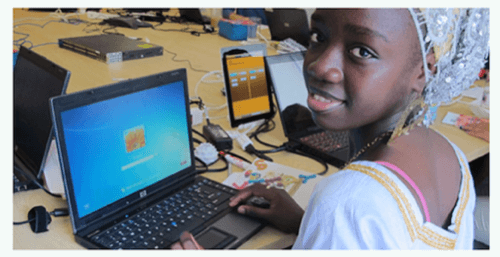
The high-tech industry is largely a guy’s world made up of “brogrammers” and job ads that ask, “Want to bro down and crush code?” Small wonder that women made up just 21% of all programmers in 2010, off from 24% in 2000. Or that less than 10% of venture-backed companies have women founders. An organization called Girls Who Code is trying to reboot the system starting from the beginning.
Girls Who Code is working to close the tech gender gap by teaching girls 13 to 17 the skills they need for a career in technology. Its first program is this summer, eight weeks of 8-hour sessions in New York City where 20 girls are learning everything from coding to pitching a business plan to investors.

Program founder Reshma Saujani, an unsuccessful 2010 candidate for Congress and former deputy public advocate for New York City, says she started Girls Who Code not only to educate girls but to inspire them to believe that they can indeed pursue a career in technology.
It’s Still A Man’s World
Getting started is one thing. Inspiring them to stick with it could be more difficult. Consider Silicon Valley, circa 2012. Marissa Mayer notwithstanding, it’s a sort of parallel universe, fueled by testosterone and 5-Hour Energy drinks, where young male programmers freshly empowered by the te ch boom revel unselfconsciously in a high-fiving culture of chips and beer.
It’s a place where breasty booth babes are still a must at gadget shows. Where recruiters invite guys to parties with hot tubs full of naked women. Where accelerator grads include slides of bikini-clad chicks in their pitch-day presentations – because they can. And where a company called Sqoot holds an API hackathon with a list of “great perks” that includes massages, a live DJ and “Women: Need another beer? Let one of our friendly (female) event staff get that for you.”
Serious Support For Girls
Girls Who Code has funding from a range of corporate sponsors, including GE, Google, eBay and Twitter (it’s Twitter’s first philanthropic investment). Every contributor not only writes a check but also hosts a field trip, donates equipment or sends a speaker. Among those on tap this session are Jack Dorsey of Square, GE chief marketing officer Beth Comstock and Gilt Groupe founder Alexis Maybank.
“These companies don’t just want to close the technology gap because it’s the right thing to do for the country but because it’s the right thing to do for their business,” Saujani says. “They understand they can’t out-innovate unless they have the people who are using their products actually making their products.”
She points out that while women use the Internet 17% more than men do and create two-thirds of the content at social media sites, they earn only 14% of computer science degrees.
“At age 13 or 14 there is something that happens that makes girls think coding or engineering is not for them. Part of our mission is pushing girls to go into these technical fields and overcome their aversion to risk.”
And to jobs that invite them to “bro down and crush code.” It’s a noble mission but it won’t be easy.
Images courtesy of Girls Who Code.

















